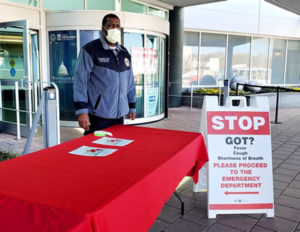
The external COVID-19 screening point at the DCVAMC, where those wishing to enter the building are asked the CDC screening questions. Those who pass the screening receive a color-coded “sticker-of-the-day”.
DC Staff Battles to Save Lives of Veterans With COVID-19
WASHINGTON—The first time Michael Heimall heard about the novel coronavirus COVID-19 was in late January 2020 during a presentation at the auditorium of the DC VAMC. The members of the hospital’s infectious disease section were providing a presentation to Heimall, the VAMC’s director, and to the hospital’s service chiefs about what was happening in Wuhan, China.
Thinking back, Heimall is grimly amused at how removed the news felt at the time. “At that point we thought, ‘Hmm, interesting academic drill,’” he said.
Soon after, on Feb. 6, the hospital saw its first possible coronavirus case—a veteran who had spent time in Wuhan who came in complaining of a sore throat. That veteran was called into the emergency room, and staff donned surgical masks to collect the test. It turned out to be negative.
A month passed. Energy at the DCVAMC was focused on preparing the hospital for its Joint Commission accreditation. But the infectious disease team was concerned about the news coming out of Washington state, the first major coronavirus hotspot in the United States. The first week of March, Heimall and his staff ran a tabletop planning exercise envisioning how the hospital would respond if the coronavirus arrived in DC. How would they reconfigure the hospital and its staff to deal with a surge of highly infectious patients?
On March 6, the Joint Commission came and went. That same day, the hospital admitted its first patient to rule out COVID-19. The veteran was not able to self-isolate while waiting for test results to come back, so the hospital admitted him.
The veteran’s test also came back negative, but it jump-started the hospital’s preparedness effort. That weekend, Heimall and senior staff held an all-day planning session on screening, testing and expansion. They decided that a 28-bed surgical unit on the fourth floor would be dedicated to COVID-19 patients.
“That area has 12 negative pressure rooms,” Heimall explained. “It was also the unit that had been trained up for Ebola response back in 2014. So, many of the nursing staff there were familiar with high consequence infections. And we knew we would need intensive care capability, and the ICU and ICU step-down are also on the fourth floor.”
On March 13, another veteran came in with symptoms. At that point, the hospital was using state labs based on where the veteran lived—the DCVAMC treats patients from DC, Maryland and Virginia—and the results didn’t come back until March 16. They were positive.
“Numbers picked up pretty quickly from there,” Heimall said.
Continue Reading this Article: Profoundly Altered
